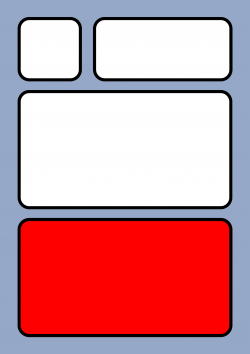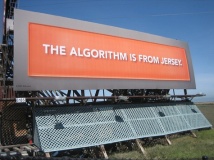Footnote
| Design of xkcd.com | Links • Tagline • Header text • Comic • Title text • Footer comics • Feeds • Comics I enjoy • Other things • Warning • Bitcoin address • Footnote • License and copyright |
- This article is about the text at the bottom of xkcd.com. For comics featuring footnotes, see Category:Footnotes.
The footnote on xkcd is displayed beneath Randall's list of "Comics I enjoy". It's intentionally set to a very tiny font size, which makes it hard to read without zooming in. It states:
- xkcd.com is best viewed with Netscape Navigator 4.0 or below on a Pentium 3±1 emulated in Javascript on an Apple IIGS
- at a screen resolution of 1024x1. Please enable your ad blockers, disable high-heat drying, and remove your device
- from Airplane Mode and set it to Boat Mode. For security reasons, please leave caps lock on while browsing.
Here is a zoomed-in version:
- xkcd.com is best viewed with Netscape Navigator 4.0 or below on a Pentium 3±1 emulated in Javascript on an Apple IIGS
- at a screen resolution of 1024x1. Please enable your ad blockers, disable high-heat drying, and remove your device
- from Airplane Mode and set it to Boat Mode. For security reasons, please leave caps lock on while browsing.
The text gives questionable advice on how to view xkcd.com. Using a discontinued browser on an Apple computer released in 1986 with a screen resolution one pixel tall would be impossible.[citation needed]
| Footnote | Explanation |
|---|---|
| xkcd.com is best viewed with Netscape Navigator 4.0 or below | It is normal to specify browser and minimum version, as all later versions typically retain needed features from previous versions. Instead, the footnote claims that older versions are better (perhaps due to reliance on a bug fixed after version 4.0). No version of Netscape Navigator is maintained and the site can't be opened because of a missing security protocol. However, with a modified version of the browser, the instructions given could be plausible, due to Atwood's law. |
| on a Pentium 3±1 | Pentium was a brand of processors made by Intel. Instead of specifying a minimum processor generation (as in software system requirements), both a minimum and maximum are given. This notation is often used for specifying tolerances, usually of a physical property (e.g. electrical resistance) - a tolerance range of "Pentium 3, plus or minus one" indicates anything older than Pentium 2 or newer than Pentium 4 is sub-optimal. It may also refer to the more mathematical usage of plus or minus, which would indicate it's best viewed on a Pentium 2, or a Pentium 4, but nothing else. |
| emulated in Javascript | JavaScript is a programming language used on web pages. While it may be possible to write a Pentium emulator in Javascript, this would be a very strange choice. |
| on an Apple IIGS | The Apple IIGS was a computer made in the 1980's. Even the slowest Pentium computers are hundreds of times faster than the Apple IIGS. Combined with the inefficiencies of processor emulation, this would result in a painfully slow experience, if it worked at all. It was made before Internet connections were common, and there was probably no web JavaScript-compatible browser for it, if any browser at all. There are now Ethernet cards available for the IIGS. |
| at a screen resolution of 1024x1. | If the dimensions given are in pixels, as they usually are, then the recommended display setting would only show one horizontal line. 1024 pixels is wider than the maximum supported display width of the Apple IIGS. |
| Please enable your ad blockers, | Many sites ask users to disable ad blockers, either so the owner can get ad revenue, or because blockers sometimes inadvertently block other parts of the page. But here it is recommended to enable the blockers, even though there would be nothing to block since xkcd does not have advertisements. |
| disable high-heat drying, | This appears to be referring to clothes dryer heat settings, which are irrelevant to websites. Some clothing is damaged if dried with high heat. |
| and remove your device from Airplane Mode and set it to Boat Mode. | Many portable devices, especially cell phones and tablets, have an "Airplane Mode," which disables all radio-frequency transmissions (wifi, mobile/cellphone connectivity, etc) to avoid potential interference with an aircraft's own electronics while flying. And also to prevent your phone trying to connect to cell towers at high power because they are being constantly disconnected, the result of this is all the people's phone sending high power signals and jamming other phones. "Boat Mode" is fictional. |
| For security reasons, please leave caps lock on while browsing. | Having caps lock on would not improve security. It may reduce your security if it prevents you from using lower-case letters in passwords. It may also be just to annoy the user later, after browsing the webcomic, so that they would be mildly annoyed by discovering they had caps lock on. |
History
There have been two major footnotes displayed over the course of the site's history, with a gap of 22 days without any footnotes after the removal of the original footnote.
Original footnote
The original footnote was added between April 6th, 2007 and May 3rd, 2007. According to this Blag post, it was as reference to random billboards appearing in New York, Los Angeles, and San Francisco. They were a viral marketing campaign by the Ask Jeeves search engine to drive publicity around their new search algorithm. Randall thought the sort of people who would be curious enough to go to Google and type them in are probably the sort of people who would like xkcd, so he added the footnote to his website to attract more fans.
It’s clearly a viral marketing campaign and seems to be by Ask.com. I like puzzles like this, but at the moment it doesn’t seem to go anywhere — if you Google it, you just get blogs talking about the odd billboards. That’s not really very much fun.
It occurs to me that the sort of people who would be curious enough to go to Google and type them in are probably the sort of people who would like xkcd, so maybe we should create a twist in the puzzle. For those of you who have blogs or other sites, feel free to create links to xkcd.com with those billboard lines as the link text. I put the phrases at the bottom of xkcd.com so it won’t be filtered out as a Googlebomb.
- We did not invent the algorithm. The algorithm consistently finds Jesus. The algorithm killed Jeeves.
- The algorithm is banned in China. The algorithm is from Jersey. The algorithm constantly finds Jesus.
- This is not the algorithm. This is close.
Bitcoin addresses
- Main article: Bitcoin address
Randall added a Bitcoin address (a string of alphanumeric characters) to the original footnote between February 18th, 2013 and February 24, 2013 and changed it many times over time. Randall also had a page at xkcd.com/bitcoin, which listed other Bitcoin addresses. The following footnote only mentions the first address used, but you can view a list of all addresses here.
- BTC 14FHqYSgAi39CEJksUJJsK8JzJzyqFpLVk
- We did not invent the algorithm. The algorithm consistently finds Jesus. The algorithm killed Jeeves.
- The algorithm is banned in China. The algorithm is from Jersey. The algorithm constantly finds Jesus.
- This is not the algorithm. This is close.
Footnote removed
The old footnote was removed entirely, along with the warning above it, on September 12th, 2016, when 1732: Earth Temperature Timeline was the frontpage comic. It was probably removed to not scare potential new fans away, given the popularity of the comic. For 22 days, from September 12th, 2016 until October 4th, 2016, there was no footnote on xkcd.com.
Current footnote
The most recent footnote was added either on October 4th, 2016 or on October 5th, 2016 and has remained on the site ever since. It states:
- xkcd.com is best viewed with Netscape Navigator 4.0 or below on a Pentium 3±1 emulated in Javascript on an Apple IIGS
- at a screen resolution of 1024x1. Please enable your ad blockers, disable high-heat drying, and remove your device
- from Airplane Mode and set it to Boat Mode. For security reasons, please leave caps lock on while browsing.





